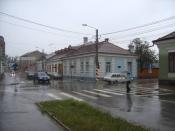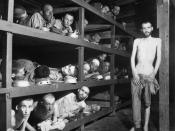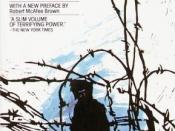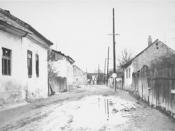Abigail Farley History 102 Mwaruvie November 30, 2001 "Night"�: Elie Wiesel "Night,"� by Elie Wiesel, is a personal account of a teenage Jewish boy from Transylvania whose life was forever altered by his traumatizing experience of living through Nazi concentration camps. It is the story of someone who lost everything dear to him, including his home, his family, and eventually his pride. He eventually manages to lose his faith in God, whom he had previously dedicated his life to. He didn't realize how God to allow he and his fellow people to suffer so, even as they continued to worship him. "Night"� shows the strength of people and their will to live. It shows how oppression does not always break one's spirit. It also shows love and devotion, even in a near death experience. Night is an incredible of the torture that Holocaust victims endured. It paints a horrible picture of the physical aspect, but shows admirable spirit at the same time.
Elie Wiesel's story begins in the small town of Sighet in Transylvania towards the end of 1941. Elie was twelve years old at the time. He was a very serious student of the Talmud and an adamant Jew. He was the only son of shopkeeper with two older sisters and a younger baby sister. He and the rest of the townsfolk believed they were safe from the Germans until 1944, when the major occupation occurred. He and the rest of the Jewish families were first moved into ghettos. There were some Germans living in Jewish households at the time. They had not been treated cruelly yet, so they did not believe they were in harms way. Then, day-by-day, more oppression followed. Jews were stripped of all rights, including their valuable belongings, had a curfew, and forced to wear yellow stars. They were not permitted in public places. They were eventually forced to leave their homes and their belongings and sent to another smaller ghetto. From there, they were forced onto trains and shipped to concentration camps, not knowing what horrible future lie ahead. A woman that he spoke of, Madame Schachter, continuously spoke of a fire. "Jews, listen to me! I can see fire! There are huge flames! It is a furnace! (p.23)"� This was also foreshadowing the fate that was to come. Elie and his father were separated from the women in the family, never to be reunited. The first camp they were sent to was Auschwitz, then onto Buna. They watched as adults and small children were fed into the mighty pits of the furnaces, some still alive. Elie and his father remained strong and relied on having each other. They spent their days doing hard manual labor and scraping for simple provisions. They were continuously moved by foot, in horrible conditions, to other camps by gunpoint. Elie and his father continued to survive watching as friends, acquaintances, and strangers were brutally tortured and murdered. Elie and his father no longer knew life. They only knew cruelty, work, and starvation. They were so near death that they no longer contained emotion. They forced themselves to continue. They were even forced to live off of snow from the ground. In their last concentration camp, very close to liberation time, Elie's father became ill with dysentery and died on the bunk below him. Elie felt that he had nothing to live for, but he managed to survive in hell on earth. He was very descriptive in all of his thoughts and in everything that was occurring around him. I believe that the title "Night"� has a strong, underlying meaning. It is used as somewhat of a symbol for terrible events. Wiesel repeatedly refers to the nighttime when speaking of misfortune. "So much had happened within such a few hours that I had lost all sense of time. When had we left our houses? And the ghetto? And the train? Was it only a week? One night- one single night? (p.34) Wiesel uses the nighttime as a symbol repeatedly, as if to deliver a subliminal message to the reader. "Night"� flows together well in chronological events, but at the same time gives inside thoughts and later reference to events that are occurring at the time.
Elie Wiesel was very fortunate in surviving the death camps. Many spent years in these camps, and millions died. He was also fortunate that he can share his horrible experience with others so that society can learn from the havoc that history has created. It is unbelievable that human beings could do this to one another. It is literally a hell on earth. All should read this recollection of Wiesel's life. It is a piece of history that is in the not too distant past, and it is fortunate that some lived to tell about it so that society learns from these horrific mistakes.





